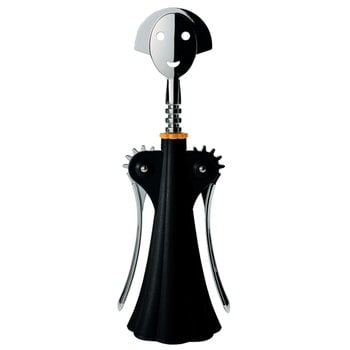Alessi’s playful Anna G. corkscrew features a figure of a woman: smiling face framed with short hair, long neck, slender arms and a long beautiful dress. The bottle opener was designed by Alessandro Mendini in 1994, inspired by his and Alberto Alessi’s friend, designer Anna Gili. Anna G. is a beloved classic and a delightful addition to any kitchen.
Anna G. corkscrew, black
Alessi
Description
Alessi’s playful Anna G. corkscrew features a figure of a woman: smiling face framed with short hair, long neck, slender arms and a long beautiful dress. The bottle opener was designed by Alessandro Mendini in 1994, inspired by his and Alberto Alessi’s friend, designer Anna Gili. Anna G. is a beloved classic and a delightful addition to any kitchen.
Product details (4)
- Material
- Thermoplastic resin, chrome-plated zamak
- Colour
- Black, steel
- Height
- 24.5 cm
- Diameter
- 7 cm
- Product ID
Designer
Alessandro Mendini (1931-2019) was an Italian architect and designer whose work has had a great influence on modern Italian design. Mendini graduated as an architect from the Polytechnic University of Milan in 1959, and in the 1970s he participated in the radical design movement and development of postmodern design theories. Besides architecture, product and interior design and installations, his work includes theoretical publications, and he has worked as publisher of Casabella, Modo and Domus magazines. Mendini was a founding member of the Global Tools design collective which was set up in 1973, and he was also a member of the "anti-design" group Studio Alchimia with designers such as Ettore Sottsass and Michele De Lucchi.
Mendini’s style is characterized by mixing different influences, cultures, forms and colours. Some of his best-known works include the Proust Armchair from 1978 and the Groninger Art Museum which was opened in the Netherlands in 2008. Mendini also taught at the Polytechnic University of Milan, ran the Atelier Mendini studio in Milan with his brother Francesco, and collaborated regularly with many internationally known brands such as Alessi. Mendini was awarded the prestigious Compasso d'Oro award three times during his career, and he held an honorary title from the Architectural League of New York.
View all productsReviews (2)
3
Based on 2 reviews
-
A
Anonymous
Miami, United States
380 days ago
-
T
Tatjana A
Tallinn, Estonia
83 days ago
Sustainability
The Product Sustainability Framework, our criteria of sustainable design, helps you find the most sustainable products in our selection. Read below which sustainability criteria this product has met.
Working conditions & labour 8/9
-
Equal opportunities for all employees
-
Commitment to UN Global Compact, fair compensation for all employees
-
Corporate responsibility requirements defined and communicated for suppliers
-
Systematic work for improved inclusion and well-being in the workplace
-
Transparent supply chain
-
Suppliers' compliance to a code of conduct ensured
-
Direct suppliers audited and certified
-
Compliance to the UN Guiding Principles on Business and Human Rights ensured in the supply chain
-
Support for community involvement in the supply chain
Eco-friendly production 8/9
-
Fair and resource-wise water-use in production
-
No incineration or landfilling of returned items
-
No use of endangered species as materials
-
No direct environmental emissions or waste (excl. GHGs) from production
-
The sustainability of direct suppliers' production is addressed and monitored
-
Production and material sourcing that respect biodiversity, animal rights, and natural ecosystems
-
Material-efficient and ecological packaging
-
No potentially harmful chemicals used in own production
-
Positive impact on nature’s well-being through operations that regenerate natural ecosystems
Climate impact 4/8
-
Company's direct greenhouse gas emissions identified and commitment to reduction
-
Product's carbon impact identified and commitment to reduction
-
Guidance on energy- and eco-efficient use of the product
-
Carbon footprint of the product calculated and goals set to reduce it
-
Contribution to climate initiatives beyond the brand’s direct operations
-
Low-carbon or compensated transportation
-
100 % renewable energy in own production and operations
-
Carbon neutral or carbon negative product
Sustainable materials 5/6
-
Sustainable and long-lasting material choices
-
No harmful or hazardous substances
-
Responsible raw material sourcing and production
-
Materials suited for circularity: monomaterials, recyclable finishings, renewable or recycled contents etc.
-
Ecological materials: natural, biodegradable, recyclable or recycled contents
-
Outstanding materials in terms of innovativeness, responsibility, sustainability and circularity: local production or sourcing, 100 % recycled content, C2C-certification etc.
Circular design 5/5
-
High aesthetic quality promoting long-term use of the product
-
Technically durable product design and material choices
-
Design for enduring life-long quality
-
Design and support for product maintenance, repair and upgradability
-
Innovative circular design solutions: circular service system, resale platform, remanufacturing, collection of used products, etc.





